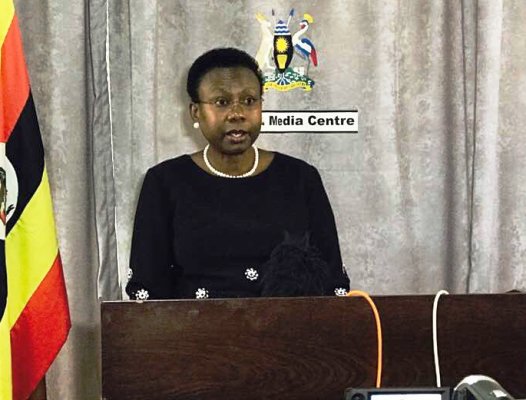Ian M. Rumanyika, the Ag. Assistant Commissioner Public and Corporate Affairs at URA
Uganda Revenue Authority (URA) is walking its mission of “providing an environment that delivers a delightful experience in revenue services and business facilitation.”
The tax body has renewed commitment of leading Uganda to economic self-sufficiency status and appeals to all taxpayers to commit to take this journey with it (URA).
Ian M. Rumanyika, the Ag. Assistant Commissioner Public and Corporate Affairs at URA, says URA shall endeavour to listen to Taxpayers, try to understand their concerns and is looking to develop Taxpayer-focused solutions that will make life easier and better for all Ugandans as the tax body promotes Voluntary Tax compliance.
“URA assures Taxpayers of a continued and sustainable commitment to enabling businesses thrive. URA is your business partner. Kakasa-your in charge of your business,” Rumanyika says.

He revealed a number of interventions URA has undertaken to support businesses during and post COVID.
i. Extended Filing of monthly returns promotional activities to encourage tax compliance amidst the pandemic. This provision has been extended in respect to VAT, PAYE, LED, WHT and Taxes under Lottery & Gaming returns. On 8th March 2020 provision was extended to taxpayers due to file returns by 15th April 2020, but were unable to file, granted 15 more days to file on 30th April, 2020. In addition, for those who failed to file their February 2020 returns by 15th March 2020 and were liable to late payment penalties, these penalties were waived, provided their February returns came in by 31st March 2020. On 8th May 2020 provision was further given to returns due for April, with the filing date extended from 15th May 2020 to 30th May 2020. Penalties and interest remitted for late filing if returned are filed by extended date. This will ease burden on taxpayers and limit the transmission risk between parties where digital channels are limited or nonexistent. These dates will be extended as the COVID -19 situation is observed.
ii. Extended Filing of annual returns promotional activities to encourage tax compliance amidst the pandemic. All tax payers whose accounting date is in September 2019 and were due to file their Corporation Tax returns by 31st March 2020 but were unable to , were granted a two (2) months amnesty. The new proposed date for filling will be May 31st 2020. Penalties and interest remitted for late filing if returns are filed by extended date. This will ease burden on taxpayers and limit the transmission risk between parties where digital channels are limited or nonexistent. These dates will be extended as the COVID -19 situation is observed.
iii. Provision extended to taxpayers to pay tax under the installment arrangement.
URA communicated on the 25th March 2020, allowing taxpayers to reschedule their payments. On 8th May 2020, taxpayers that had restructured their payments to resume in May 2020 and are unable to meet their obligations during the period, have an option to further reschedule the payments to resume in June 2020. This is on a case by case basis.
iv. Extended Warehousing period. URA has opened up warehousing of all warehousable goods for a period not more than six months to give the owners enough time to mobilize money to pay taxes. Items that were not warehousable before included; sugar, rice, foodstuffs, garments and textiles etc. These goods exclude perishables.
v. Suspension of auction of goods.
URA has suspended auctioning of goods that have exceeded the warehousing mandatory period. This is because URA is aware of the setbacks that COVID-19 has caused.
vi. Extension of grace period for containers at the port from 9 days to 14 days.
URA negotiated with Kenya Ports Authority for a grace period for free cargo clearance of Ugandan bound cargo. The free storage period has been moved from 9 to 14 days effective Monday 18th May 2020. Further negotiations will be held with the KPA to extend this to 21 days.
vii. Enhancement of more flexible and convenient payment methods to the taxpayer.
These include the traditional direct bank transfers and deposits, Visa, mobile money, payway , askURA App etc. These allow the taxpayer at all levels of income to make any payments using the most convenient method at any time and place.
viii. Automation of the Withholding tax exemptions process. This has been automated so that beneficiaries apply online. Its validity has been extended to one year instead of 6 months to make it easier for the taxpayer to carry out business with certainty and also encourage voluntary.
ix. Automation of the Tax Clearance Certificate (TCC) application to make its issuance faster. Its validity has also been extended to one year so that the taxpayer does not have to apply for it every time they have a contract.
x. Enhanced women cross border trade:
Through provision of storage facilities at all border stations and organizing them into groups where they are able to lobby for funding. Experts are also training them on skills for startup of business and access to funds.
xi. Government has remitted Customs Duty to zero % on inputs to manufacture essential medical products and supplies. These include masks, sanitizers, coveralls, face shields and ventilators for one year.
xii. Government has granted duty remission as specified to the Uganda list of all industrial inputs and raw materials for manufacture of goods to help manufacturers in the quest to boost production of the manufactured products in line with government policy on industrialization. e.g packaging for medicaments, paper packs for manufacture of juice and milk, paper for exercise books etc.
Xiii, Public Notice No 1
On 25th March 2020 URA issued a Public Notice advising that the due date for filing value added tax (VAT), withholding (WHT), pay as you earn (PAYE) and Local Excise Duty (LED) returns which were due by 15th April 2020 was extended to 30th April 2020 for taxpayers who were unable to meet their filing obligations on time.
The Public Notice also advised that taxpayers who had entered into Memoranda of Understanding with URA to make payments in March and April 2020 under the debt collection procedure could defer the payment to May 2020.
The Public Notice also encouraged taxpayers to take advantage of the Voluntary Disclosure mechanism which had been introduced in July 2019. Under this mechanism, a taxpayer who voluntarily discloses their noncompliance is only liable to pay the principal sum due with all interest and penalties waived.
Public Notice No 2
Subsequently, on 8th May 2020, URA issued another Public Notice advising that the due date for filing VAT, WHT, PAYE and LED returns which were due by 15th April 2020 and 15th May 2020 had been extended to 31st May 2020.
Amendments to tax incentives
The tax incentive regime for local investors in Uganda which includes a 10-year income tax exemption, as well as exemption from VAT, excise duty and stamp duty was amended in 2020 to provide for a lowering of the qualifying investment capital for citizens from to USD 1,000,000 to USD 300,000 when the investment is in Kampala or 50km from the boundaries of Kampala and USD 150,000 when the investment is made upcountry. This was done to encourage and support local investment in key sectors such as processing agricultural goods, manufacture of pharmaceuticals, assembly of medical appliances and establishing vocational or technical institutes among others.
Xiv. VAT Exemption
VAT exemption for key COVID-19 related items such as disposable medical face masks and fabric masks, medical boots, medical aprons, surgical caps, protective goggles, infra-red thermometers, disinfectants or sanitisers, motorized fumigation pumps, oxygen cylinders, body bags and so on. The inputs required for the manufacture of these items are also exempted from VAT.
XV. Stamp Duty
Stamp Duty chargeable on the following loan related instruments such as debentures, equitable mortgages, and further charges which was previously 0.5% of the amount being borrowed was made NIL. This was to encourage and support access to credit.
XVI. Income Tax
The presumptive tax regime was overhauled lowering the tax to be paid for each band and to introduce a preferential regime for taxpayers with records. This arrangement is a customised arrangement for small businesses to enable and improve compliance.
Businesses with gross turnover below 10milion, they pay NIL Tax, those exceeding Ugx 10 m but does not exceed Ugx 30 m 0.4% of annual turnover in excess of 10 m Or pay Ugx 80,000 if they don’t have records.
Exceeding Ugx 30 m but does not exceed Ugx 50m, Ugx 80,000 plus 0.5% of annual turnover in excess of Ugx 30 million or Ugx 200,000 if the business doesn’t keep records
Exceeding Ugx50m but does not exceed Ugx80m, Ugx 180,000 plus 0.6% of annual turnover in excess of Ugx 50 million or a flat annual rate of Ugx 400,000 if the business has no records
Exceeding Ugx 80m but does not exceed Ugx 150 m, Ugx 360,000 plus 0.7% of annual turnover in excess of Ugx 80 million or Ugx 900,000 if the business has no records.






